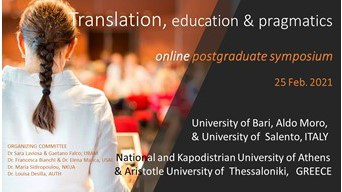Description
Translating destiny in Greek versions of Macbeth
Athanasios Vasileiadis
M.A. ‘English Language, Linguistics and Translation’, Specialization ‘Translation Studies and Interpreting’
Destiny has been a troubling concept through the ages. People have pondered on its existence or inexistence for as long as there have been organized human societies. Many have come to accept it as a driving force in life, while others tend to reject it. Scholars have been concerned with whether and to what extent people rely on fate and destiny rather than on one’s own achievement. Hampden-Turner and Trompe¬naars (2000) have measured inner/outer direction (in corporate cultures) by asking questions highlighting the advantages of self-determination and inner control vs. the advantages of contingency, luck, fate, and circumstance. The aim of the study is to show how notions of destiny and fortune travel through Greek versions of Shakespeare’s The Tragedy of Macbeth. In comparing four target versions of the text, two of which were performance versions, the study shows how the concept of destiny is one of major significance in the target context. Findings indicate that all three translations favor impactful words when referring to fate, whereas Shakespeare’s original used more loose terms. Results suggest that translated performance versions may assign high significance to the notion of destiny, while others may tone it down favoring a more secular approach as to whether people can determine their own future or rely on higher, abstract powers that weave the strings of destiny. The study relies on both unelicited and elicited data. A questionnaire was distributed to bilingual postgraduate students, in their late 20s – early 30s, for eliciting information on whether the current Greek reader would appreciate awareness of the power of destiny in fiction and theatre. Translation seems to be a powerful channel conveying aspects of pragmatic awareness.

